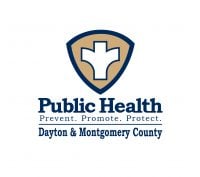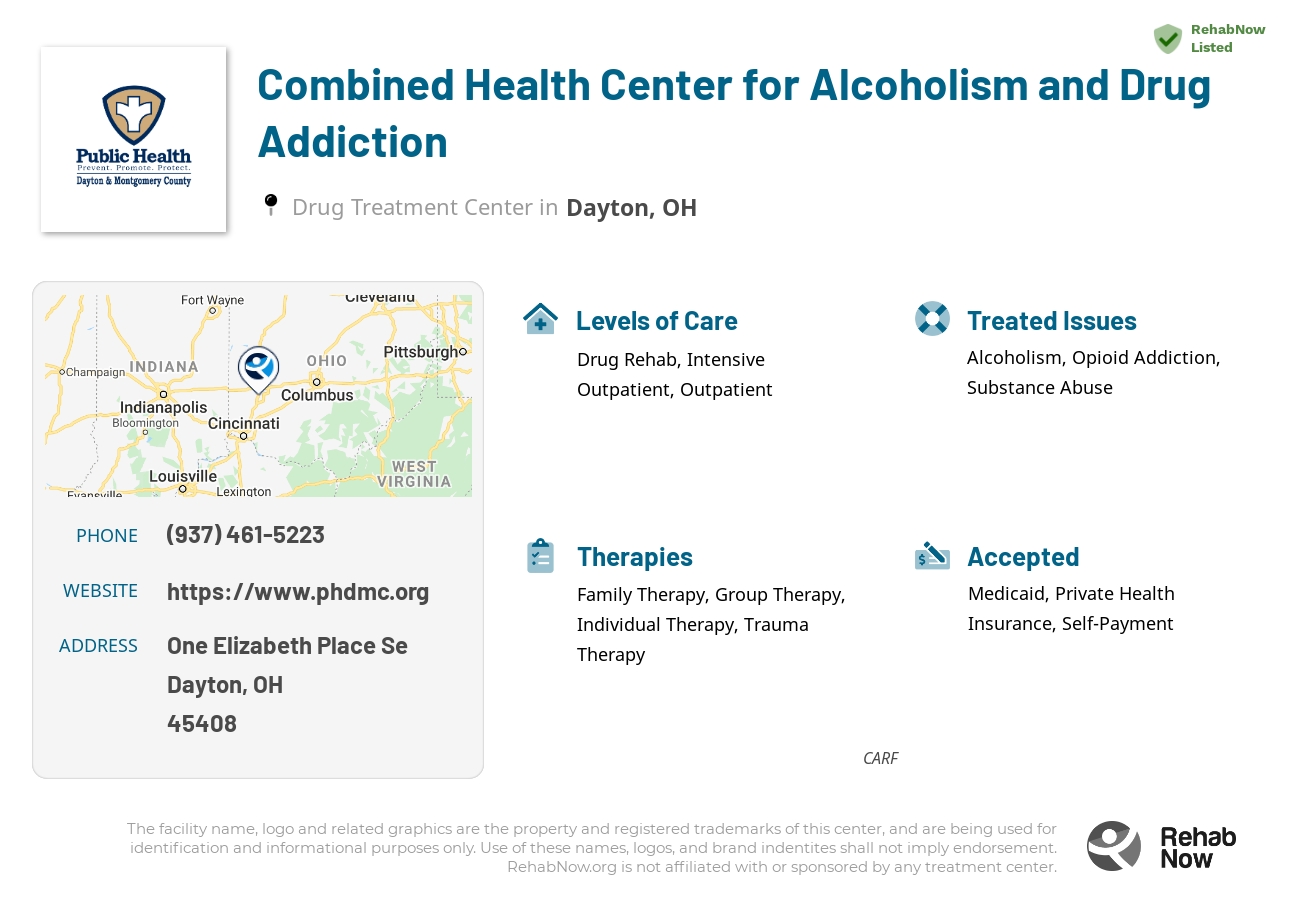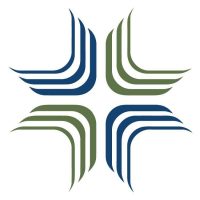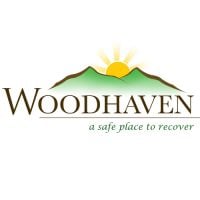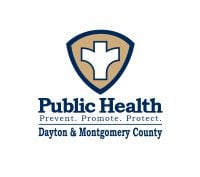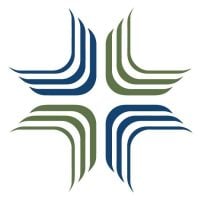Combined Health Center for Alcoholism and Drug Addiction
Drug Rehab Center in Dayton, Ohio
Dayton and Montgomery County - Addiction Services in Dayton, Ohio is an addiction treatment facility providing individualized treatment plans and a comprehensive range of services for those suffering from alcohol and opiate addiction and other substance abuse issues.
About Combined Health Center for Alcoholism and Drug Addiction in Ohio
Located in Dayton, Ohio, the Combined Health Center for Alcoholism and Drug Addiction delivers comprehensive outpatient treatment for those grappling with alcohol and substance addiction. This facility stands out due to its inclusive public health approach, a broad spectrum of services including Medication Assisted Treatment, and a commitment to adapting to the community's evolving needs.
- Inclusive Treatment Approach: Services are provided without discrimination, ensuring everyone has access to the care they need.
- Comprehensive Services: Offers a mix of individual counseling, group therapy, family support, and Medication Assisted Treatment.
- Flexible Program Length: The outpatient program length is tailored to individual progress and life circumstances, generally lasting around 16 weeks.
Accredited by CARF, the facility upholds high standards in addiction treatment and recovery services. It offers an Adult Outpatient program, problem gambling treatment, and specialized care for opioid use disorder through the community-based CBAT program.
Treatment here addresses alcoholism, opiate addiction, and other substance use disorders. The approach includes accurate diagnosis, Medication Assisted Treatment, intensive outpatient care, and support for long-term sobriety through various therapy and counseling modalities.
Genders
Ages
Modality
Additional
Accreditations

CARF
The Commission on Accreditation of Rehabilitation Facilities (CARF) is a non-profit organization that specifically accredits rehab organizations. Founded in 1966, CARF's, mission is to help service providers like rehab facilities maintain high standards of care.
Conditions and Issues Treated
Substance abuse is defined by the continued use of drugs or alcohol despite negative consequences, such as legal or work problems. It can be treated using a variety of services, including therapy and medication.
Substance abuse treatment is beneficial for:
- People who have been using drugs or alcohol for a long time.
- People who have been using drugs or alcohol to cope with stress, anxiety, or depression.
- People who have a mental health disorder in conjunction with substance abuse.
- People who continue to use drugs or alcohol despite the harmful effects they cause on their own life and the lives of others.
- People who have had multiple failed attempts at recovery without medical assistance.
If you believe that addiction treatment is right for you or a loved one, you can contact your primary care physician, or search for addiction treatment centers in your area. Treatment is beneficial to people who are motivated towards recovery, and who understand the benefits of professional care.
Opioid addiction is a common form of addiction, often caused by prescription drugs that are abused. Addiction is treated by detoxifying the body and following up with therapies to correct behavior and target the root of the problem.
Most opioid addiction begins with patients being prescribed painkillers after an injury or surgery. The body becomes used to the chemicals in these medications and soon no longer responds to their presence. As a result, addicts seek out stronger opiate-based medications like Oxycodone to compensate for the lack of effectiveness.
The most dangerous aspect is that these addictive behaviors often get carried over onto illicit drugs like heroin, which are increasingly potent and result in lower life expectancies.
Levels of Care Offered
This center offers a variety of custom treatment tailored to individual recovery. Currently available are Detox, Drug Rehab, Intensive Outpatient, Outpatient, with additional therapies available as listed below.
Detox is the body’s process of removing toxins. In substance abuse, detox refers to the process of getting rid of drugs already present in the system once the patient stops further intake. Detox is the initial recovery step. Physiological drug dependence over time can lead to symptoms of withdrawal. Depending on the symptom severity, the detox process is managed either medically or clinically. While medically assisted detox relies on specific medicines, clinical or social detox relies on providing the patient with emotional and psychological support.
Intensive Outpatient Programs (IOPs) are a form of drug treatment that allows individuals to receive the therapy they need while remaining in their homes and community. IOPs allow for the flexibility to continue working and living at home while still meeting treatment demands.
Outpatient treatment programs are less intensive than an inpatient program. Participants live at home while working or going to school. Benefits include being able to continue relationships with family, friends, and work/studies. Treatment includes educating patient on addiction to drugs, medication, and counseling. Benefits include being able to continue relationships with family, friends, and work/studies. Treatment includes educating patient on addiction to drugs, medication, and counseling. Counseling sessions are for either individual or group.
Therapies & Programs
Individualized Treatment is essential because it gives addicts the ability to participate in a program that meets their unique needs. An addict should work with professionals who understand what they’re going through, especially if the addict is actively using.
Trying to find a treatment program that meets your needs can be challenging. It’s even more complicated if you don’t know what kind of treatment you need. Being able to have professionals who are experienced with treating your situation is key to getting sober. Finding the right treatment program for an addict is difficult, but it’s even harder without communicating with those who have experience treating your specific situation.
Family dysfunction can often be the underlying cause of substance abuse. To get sober, you need to find a different way to cope with the pain in your life. Family therapy can help you and your family deal with old issues that may trigger substance abuse. It will help everyone understand why each member of the family feels and acts the way they do. It can give everyone new tools to manage their emotions so that they don’t want to drink or do drugs.
A person looking for drug recovery should know that group therapy is an essential tool. Group therapy provides accountability and friendship to people with addiction. It is recommended as a lifetime treatment habit. Group therapy occurs in a group setting as opposed to a one-on-one setting. It benefits patients by providing a feeling of support and letting them know they are not alone. Patients at Combined Health Center for Alcoholism and Drug Addiction also learn to build trust and understanding and gain perspective through discussions.
If you are looking for a drug addiction treatment program that also provides trauma therapy, then Combined Health Center for Alcoholism and Drug Addiction in Dayton, OH is a great option. The staff at this facility specialize in helping people process and understand the past traumas that have led them to addiction. This approach can help individuals move forward with their recovery and take a better hold of their sober future.
The benefits of trauma therapy at Combined Health Center for Alcoholism and Drug Addiction in Dayton, OH are as follows:
- People will become less likely to engage in self destructive behaviors.
- Their emotional and mental health will significantly improve.
- They will be more confident in their abilities to live an addiction-free life.
- People will be able to connect with other people on a deeper level.
- Their problems with intimacy and trust will improve.
The 12-step program is one of the most common forms of addiction treatment today. It consists of attending meetings and working with a sponsor to follow the 12 steps outlined by Alcoholics Anonymous. This method is not for addicts who are unwilling to or have no desire to quit using and so is best utilized when paired with other treatment methods.
Payment Options Accepted
For specific insurance or payment methods please contact us.
Is your insurance accepted?
Ask an expert, call (888) 674-0062
PHMDC Associated Centers
Discover treatment facilities under the same provider.
Learn More About PHMDC Centers
Additional Details
Specifics, location, and helpful extra information.
Dayton, Ohio 45408 Phone Number(937) 461-5223 Meta DetailsUpdated April 15, 2024
Staff Verified
Combined Health Center for Alcoholism and Drug Addiction Patient Reviews
There are no reviews yet. Be the first one to write one.
Dayton, Ohio Addiction Information
Ohio is suffering from a drug abuse problem that is costing thousands of its residents their lives every single year. Opioids, particularly Fentanyl and heroin, are the leading drugs in the state. The state ranks in the top 10 for illicit use of painkillers. Opioid-related overdose rates in Ohio are by far some of the highest in the country.
The drug addiction problem in Dayton, Ohio, is unfortunately quite severe. Around 11,000 people in Dayton are addicted to drugs, and this number continues to grow each year. The majority of these individuals are addicted to opioids, heroin, and other illicit drugs. Heroin was involved in 1,419 overdose deaths in 2016, a 31% increase from the previous year. There are many rehab facilities in Dayton, so finding help is easy.
Treatment in Nearby Cities
- Saint Clairsville, OH (176.5 mi.)
- Caldwell, OH (142.7 mi.)
- Hilliard, OH (58.7 mi.)
- Westerville, OH (72.2 mi.)
- Coldwater, OH (55.5 mi.)
Centers near Combined Health Center for Alcoholism and Drug Addiction
The facility name, logo and brand are the property and registered trademarks of Combined Health Center for Alcoholism and Drug Addiction, and are being used for identification and informational purposes only. Use of these names, logos and brands shall not imply endorsement. RehabNow.org is not affiliated with or sponsored by Combined Health Center for Alcoholism and Drug Addiction.
